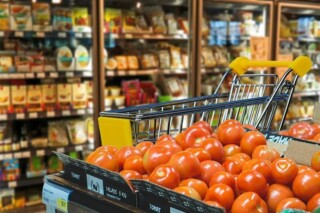Since the pandemic broke out, consumption has started to fall – traffic has plummeted in tourism, all types of traffic, travel and shops, not counting the first wave when citizens would buy huge stocks of basic groceries… The latest data from the Ministry of Finance shows that private consumption fell by 15%. Only government spending, as a countercyclical component, increased by 0.3 %. Investments in fixed assets are lower by 26 percent, imports of goods and services are lower by more than 31 percent. GDP in the first six months of this year is down 10.3 percent.
Pobjeda asked economists, analysts, bankers and representatives of trade unions about how to boost consumption. They all admit that it’s not easy to answer that question.
The pandemic dictates
Secretary General of the Association of Banks, Mr Bratislav Pejaković, said to Pobjeda that there was a growing global concern.
“The pandemic is a global problem. As a response, states have been drawing their finances and increasing public debt and it becomes certain that the recovery won’t be fast or easy at all. However, we can expect significant revival of all economic activities as soon as (or if) the vaccine is produced”, he says.
The role of banks and concrete reaction of the system in this situation has been emphasized several times.
“Moratoriums significantly supported the consumption and the economy and budget revenues. Now it’s even possible to restructure liabilities with banks”, Mr Pejaković points out.
When we talk about companies, he adds, in accordance with the restructuring, significant changes should be made to the debt structure, strategy, business and organizational structure, increase efficiency and adapt to new market conditions.
The country should prepare for new investments as well.
“The recommended approach for the state would be to, in addition to reducing costs, prepare for new development investments – infrastructure works by finding quality sources of funds, partners and investors. In economies, progress depends on wealth in circulation. If its circulation stops, it loses value and the economy is entering a recession “, Secretary General thinks.
In addition to the negative effects, the recession, which is part of the business cycle, and today a consequence of the pandemic – also serves to reduce production costs and capital goods due to reduced demand.
CEO of Montenegro Business Alliance, Mr Milan Dragić, said that we could stimulate the growth of consumption only by strengthening the economy, and that is undoubtedly not an act but a longer-term process, especially in the existing conditions.
“It is the duty of the state to find a way and help the economy, regardless of the fact that it is in a delicate situation. The economy in the coming period needs a significant financial stimulus from domestic and foreign sources. It is clear that ours, as well as the world economy, will face numerous challenges on the road to recovery, which will be neither quick nor easy”, he says.
He adds that reduced consumption is one of the significant problems, because the dynamics of economic recovery depends on it.
“The fact is that all sectors have been affected by the pandemic which has affected the world economy, so that circumstance will also affect the economic condition of national economies. It is certain that the total consumption will be significantly lower, which will certainly have a negative impact on economic trends in the coming period. The situation is aggravated by the fact that tourism, as one of the priority sectors for the development of our economy, is in big trouble due to the corona virus. The favorable circumstance is that in the event of an end to the pandemic or a significant reduction, it can recover relatively faster. In general, the growth or further decline in consumption will depend on the situation in all sectors. If the pandemic lasts, the problems will be bigger”, says Mr Dragić.
Economic analyst and professor at the Faculty of Management, Dr Vasilije Kostić, said that he would refrain from forecasts for several reasons.
“The COVID-19 crisis has reduced economic activity, reduced the incomes of citizens and companies, which is why they have redefined the structure of consumption, turned to the primary one. It is certain that the overall decline in consumption will be significant – both for households and companies the situation is less certain. The state should (if it has the opportunity) help the economy and citizens to make the depth of the decline as small as possible and mitigate the general decline in demand”, Dr Kostić explains, adding that the answer to the movement in the coming period will give a crisis.
He points out that the reduction of consumption is only one of the problems, that is, one element of the macroeconomic equation, but it is very important because our economic growth is based on consumption.
Dr Kostić points out that there are many unknowns regarding the understanding of economic growth and what conditions it.
“In our professional and lay public, this relationship is often unjustifiably simplified and reduced to a linear cause-and-effect relationship between consumption growth and economic growth, and if this relationship is asymmetric rather than linear and often opposed. Such a perception of the relationship has in many cases been wrong and that’s why the question should be asked: how to stimulate economic growth in order for consumption to grow? Economic growth should precede consumption and not the other way around”, Dr Kostić points out.
Citizens and economy want less loans, while the state wants more
Six-month data shows that the demand for loans from citizens and the economy has decreased, but the demand from the state has increased.
“In the first six months, Montenegrin commercial banks approved 385 million new loans, which is by 32%less than in the same period last year. The dominant part of the newly approved loans – €169.5 million or 44 % are those for liquidity, followed by cash loans with €82.8 million or 21.5 %”, says the Secretary General.
It is ungrateful, he adds, to estimate how much the consumption will amount to, but the aforementioned information can lead to certain conclusions.
92.9% of states in recession
It has not been recorded in history, says Mr Pejaković, that the percentage of countries that are experiencing a recession at the same time is 92.9 %.
“During the Great Depression (from 1929 to 1931), this percentage reached 83.8%, and during the world financial crisis from 2007 to 2009, it was 61.2 %” Mr Pejaković recalls adding that the causes go beyond the traditional thinking about financial and economic cycles, which makes the projections of further economic movements very questionable.
Decline in salaries and pensions should not be allowed
The Union of Free Trade Unions said that the data showed that we are in a difficult situation due to the pandemic – according to Monstat, from March to August the number of employees was reduced by over 15,000, tourism revenues will drop by 80%, public debt is growing, citizens are reducing spending to basic levels.
“In order for the economy to start from the” dead point “, it is necessary to empower households to spend more, not to allow a drop in wages and pensions, to enable favorable consumer loans for consumer goods and services, to free up investment in the economy, new technologies and projects. .. Because only with a larger turnover of money will we start the economic cycle, and thus enable a faster recovery of the economy. It will take months to return everything to its previous state and spending to the level before the pandemic, “said Mr Marko Subotić, economic advisor to USSCG.
In addition, as Mr Subotić explains, we have 40,000 “black” employees and a large number of those who receive part of the salary on hand, who were most affected, because it was easiest for employers to fire them.
Perhaps this, he says, is the last warning that the economy cannot be predominantly based on just one branch, and that we must rely on other activities and natural resources that Montenegro has at its disposal.




